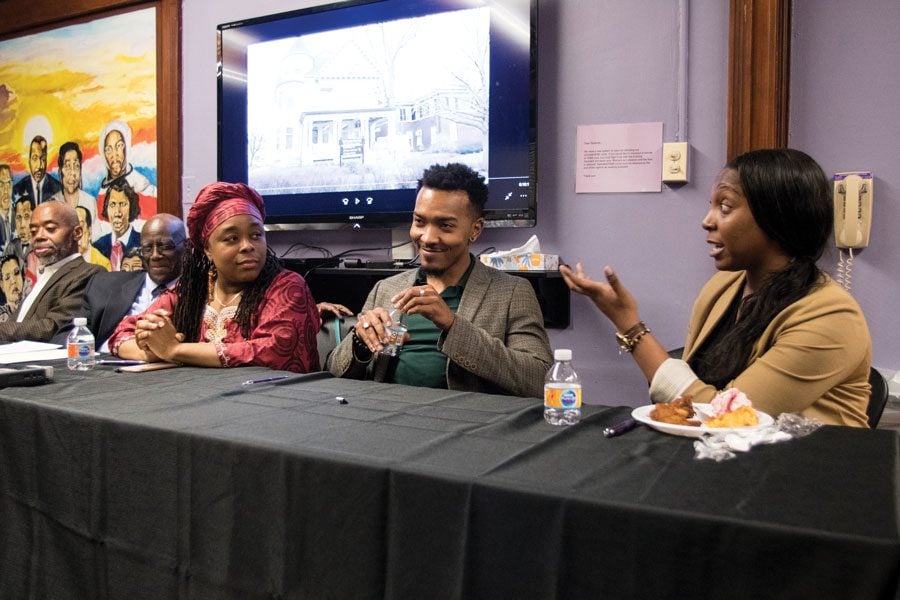For Members Only panelists discuss history, future of black community at NU
Colin Boyle/Daily Senior Staffer
FMO former board members Will Evans, Herman Cage, Asadah Kirkland, Justin Clarke, and current president of FMO Kasey Brown (left to right) participate in a panel at the Black House. On Tuesday night, the panel discussed the past and future of the black community at Northwestern University and the 50th anniversary of the Bursar’s Office Takeover coming up in May.
February 21, 2018
The past, present and future of For Members Only, Northwestern’s black student alliance, gathered in the Black House on Tuesday night for a panel discussion about the evolution of the black community at Northwestern since the group’s founding 50 years ago.
Roughly 30 people attended the event, which started with a video by panelist Asadah Kirkland (Communication ’93). The video, titled “Continuum,” depicted how the presence of black students on campus during Kirkland’s time as a student was a continuation of what students fought for in the past.
The panel included five important faces of FMO, including Herman Cage (Weinberg ’69, Kellogg ’73), who founded the group in 1967. Cage said he was inspired after seeing a country club sign that read “For Members Only,” sparking a thought that black students on campus “needed an entity that was theirs and theirs only.”
Along with Cage sat former FMO board members Kirkland, Will Evans (McCormick ’77), Justin Clarke (WCAS ’13) and current president of FMO Kasey Brown.
Kirkland emphasized the importance of recognizing the Black House as “sacred ground.” She pointed out that the tuition paid by students is an investment in the presence of the house.
“Do not allow this University to take it from you, from us,” said Kirkland.
Throughout the panel, the speakers discussed the history of the 1968 Bursar’s Office Takeover, when over 100 Northwestern students occupied the office with a list of demands for the University. Cage said people “were serious about being there” as he described his experience during the historic event, during which he was in charge of delivering food and supplies to the office.
Panel members also compared FMO’s financial situation and relationship with Associated Student Government across the decades. Clarke and Kirkland touched on the importance of strength in numbers when participating in ASG meetings to make their presence heard.
“We ran on a ticket: you vote for me, you vote for all of them,” Kirkland said. “If there were seven board members, open that door, seven of us come in to negotiate the terms, to negotiate the budget. It wasn’t one person walking in, feeling overwhelmed.”
As the panel wrapped up, speakers examined how FMO and Northwestern had impacted their lives. In his leadership experience with FMO, Clarke said he matured most through his community work and his interaction with administrators.
“It taught me how to make a way when there is no way,” Clarke said.
Brown told The Daily that events like the panel allow students and alumni to find out what is needed for the Black House to continue to thrive at NU, especially with the 50th anniversary of the Bursar’s Office Takeover coming up in May.
“We have a lot of events … over the past year that are geared toward teaching students of all colors, of all shades, from every community about the importance of this commemoration,” Brown said, “and how they can come celebrate and honor a lot of those students that made change on this campus.”
Email: [email protected]
Twitter: @colinbphoto












